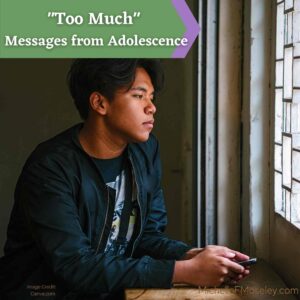What are the songs that most define your life, the ones that take you right back to a memory? It’s quite likely those are songs from your adolescence. Teens’ brains are primed to experience things intensely and to be impacted by those experiences. That goes for everything from music to interacting with peers to the input received from adults during the teen years. This knowledge of adolescent development can shed light on some of the experience and behavior of adolescents.
I work with lots of folks who have received message of being “too much” at some point in their lives. Many of these folks are now adults who have recognized the extra baggage they’ve been carrying around from messages they received during adolescence; some are currently teens and getting support in dealing with messages that are penetrating their world in the present.

Messages from Parents
Imagine you’re 13 and have spent the past few months talking to someone you really like. Then, one day, that person is walking down the hall holding hands with someone else and ignores you completely. You might be experiencing a big jumble of emotions. One minute you feel sad and want to cry, then you might be angry and feel like screaming. The adults in your home notice and ask, “Why are you so moody? It was just puppy love.” You’re absorbing the message that you’re “too emotional”, that your reaction to this new kind of pain is “too dramatic.”
You’re 15 and just starting to think about potential careers based on your interests. You’ve always enjoyed music, and have the opportunity to learn to play bass guitar. You mention to your parent that you might want to be a musician after finishing high school, and you’re given a multi-point list of why that’s not practical. You’re hearing that you’re “too dreamy” and learning that it’s not safe to voice your ideas.
Messages from Peers
Imagine you’re entering 9th grade, transitioning to a new school and interacting with new people. You’ve made plans all summer with your close friend from middle school – comparing schedules, talking about where you’ll eat lunch. Once school starts, your friend starts hanging out with a different group of people and doesn’t seem to have time for you anymore. Maybe you and your friend stop talking as much and eventually just drift apart. Or maybe your friend actively rejects you. You’re getting the message that you’re “too uncool”, “too easy to leave.”
You’re in 11th grade. You’ve gotten the hang of your high school schedule. And you’re very aware of how every action and decision is judged by your peers. Sometimes in person, sometimes online. Sometimes even for things you didn’t actually do or say. You feel like whatever choices you make, you’re going to be “too much” of something – “too conservative”, “too slutty”, “too
smart”, “too unconventional.” It’s hard to figure out who you actually are when there is so much awareness of all the possible judgements.
Messages from School
Imagine you’re heading into 8th grade after summer break. A break where you grew 3″ and you’re still feeling a little discombobulated with this growing body of yours. Your first day, the principal pulls you aside to remind you of the dress code and point out that your shorts are not longer than where your fingertips can reach. This might send the message that you’re “too revealing” or “too disobedient.”
You’re excited that your class is finally discussing a topic that gets you excited. You speak up during the discussion, sharing your thoughts, but the teacher makes a comment about how little understanding and experience you have as a teenager. You interpret that as saying you’re “too young” or “too naive” and stop speaking up in groups.
Sound Familiar?
Messages like these can shadow one’s adolescence and follow you into adulthood. You may be left wondering what aspects of yourself are allowed to show, to take up space, and what parts are best left hidden.
If some of this resonates with your experience, or you’re starting to make some connections around what may be going on with your adolescent child, you can contact me and explore next steps and getting support and healing the wounds of these “too much” messages.
This is part two of a multi-part series on how the messages of being “too much” can impact our lives. Check out the first post, regarding messages from childhood, and stay tuned for the rest of the series.
Disclaimer: While these examples are based on common themes I hear in my work as a mental health counselor, please know they are not the direct story or experience of any one client.
Michelle F. Moseley is a licensed clinical mental health counselor providing telehealth services in the state of North Carolina. She specializes in providing support for folks who struggle with feeling they are “too much”, yet worry they are not enough. She works from a trauma-informed perspective, and believes that ALL people deserve respect, compassion, and to feel heard. Learn more about Michelle by visiting www.MichelleFMoseley.com or following her on Instagram – @therapy_with_michelle
